Court hearing resumespublished at 06:16 GMT 10 January 2022
After a brief adjournment, the court is back.
Novak Djokovic has returned to the tennis court after winning a legal battle in Australia that overturned his visa cancellation
"I'm pleased and grateful," the unvaccinated tennis star tweets after midnight local time, alongside a picture of himself back in training
"Justice has won and the rule of law has won," his father tells the media at a family press conference in Serbia
The family refuse to answer questions about Djokovic attending indoor events after he tested positive for Covid in December
Djokovic's lawyers argued in court that the visa cancellation at Melbourne airport last week was unreasonable and the judge agreed
But Australia's immigration minister still has powers to re-cancel the reinstated visa and deport the tennis player
The Australian Open begins on 17 January and if Djokovic wins, he will become the most successful men's player in history
Edited by Joel Gunter
After a brief adjournment, the court is back.
 Katie Silver
Katie Silver
BBC News, Melbourne
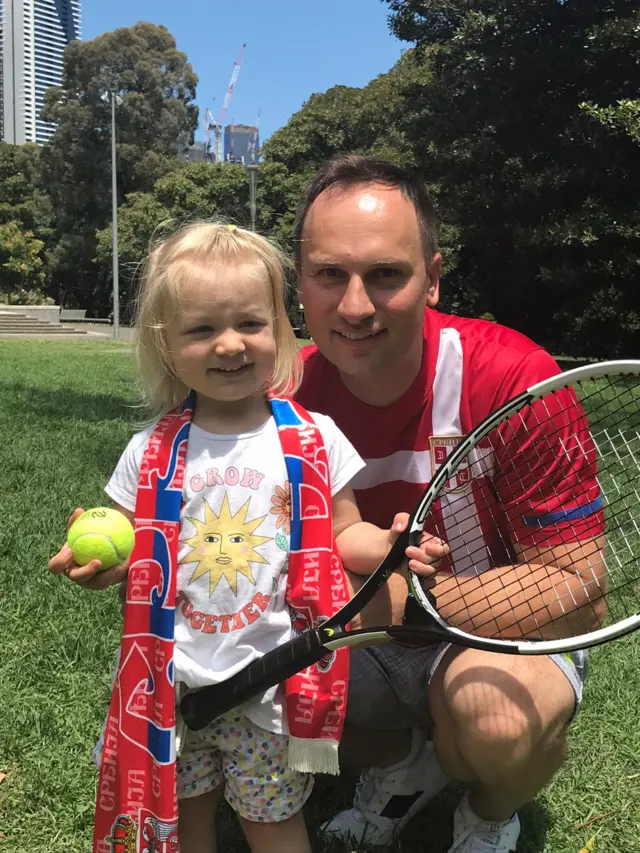
Gigi Romic, with daughter Lana, is hopeful Djokovic will succeed
Gigi Romic and his two-year old daughter Lana are among the Serbian-Australians who have come out in support of the tennis champion.
Mr Romic, who migrated to Australia 20 years ago, told the BBC: “I’m double-vaxxed but it doesn’t matter – there should be some exceptions to the rule. Before coming to the country, it should be clearer.”
“He’s won so many times here too and he actually brings the whole Serbian-Australian community together.”
Mr Romic is hopeful Djokovic will be given the all clear to enter and play at the last minute.
 Russell Fuller
Russell Fuller
Tennis correspondent in Melbourne
This is the second time in 18 months that Novak Djokovic’s hopes of winning a Grand Slam rest on the decision of a judge.
In September 2020, and in the absence of top seeds Roger Federer and Rafael Nadal, Djokovic was a hot favourite to win the US Open title in New York.
But then, in the fourth round, he took a loose ball out of his pocket and swiped it angrily towards the back of the court. Though far from intentional, it caught a line judge flush in the throat.
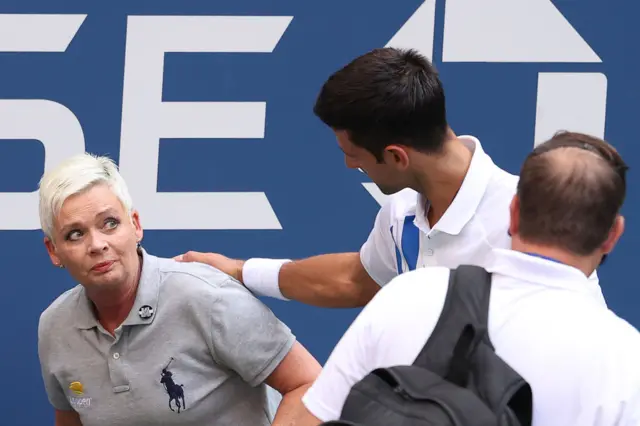 Image source, Getty Images
Image source, Getty ImagesDjokovic's ball hit line judge Laura Clark at the US Open in 2020
Disqualification seemed the only avenue open to the officials.
After a long on court conversation with Djokovic, in which the Serb could be heard trying to plead his case, tournament referee Soeren Friemel did exactly that.
Djokovic also lost all ranking points he had earned at the US Open and was fined the prize money he won at the tournament in addition to other fines resulting from the incident.
Andy Murray is the latest to be amused by the irony of Nigel Farage, the UK's best-known Brexit-backing politician, extending his support to Novak Djokovic.
The UK tennis star tweeted in response to Mr Farage's tweet - a video of him visiting Djokovic's family home in Serbia.
Allow X content?
This article contains content provided by X. We ask for your permission before anything is loaded, as they may be using cookies and other technologies. You may want to read X’s cookie policy, external and privacy policy, external before accepting. To view this content choose ‘accept and continue’.
Mr Farage, who has been outspoken in his support for Djokovic, flew to Serbia ahead of the tennis player's court hearing.
His stance has already drawn plenty of mockery on social media. A recent tweet read: "Leading advocate of Britain being able to control its borders criticises Australia for (checks notes) controlling its border.”
Murray has said he is dismayed at Djokovic's struggle to gain entry to Australia, and that it is "really not good for tennis at all".
The 34-year-old Briton is a five-time Australian Open runner-up. He will play at the tournament this year after missing out last year following a positive test for coronavirus.
The judge Anthony Kelly has extended the injunction holding Djokovic in Australia to 8pm local time (09:00 GMT) after the government's barrister Christopher Tran pointed out that it was expiring at 4pm.
The court has now been temporarily adjourned.
When it resumes we can expect to hear arguments from the government seeking to prove that the immigration official's decision to cancel Djokovic's visa was valid.
The case has just resumed after a 90-minute break. There was a 30-minute delay.
The government's lawyers took the time before the lunch break to outline their responses to Djokovic's arguments. It looks to be a very technical legal approach.
Novak Djokovic: Tennis Australia CEO and Australian PM speak out on visa row
Australian PM Scott Morrison says he will not comment on whether the government will cancel Djokovic's visa for a second time if he wins the appeal.
"That's purely a matter before the courts at the moment," Morrison said during a press conference.
"In relation to our government - the federal government's - advice to Tennis Australia that was set out very clearly in November."
In court documents submitted on Sunday, the government argued it has "other powers" to cancel Djokovic's visa.
“An order for immediate release does not prevent re-detention if there is power to detain,” its lawyers say.
 Amy Lofthouse
Amy Lofthouse
BBC Sport
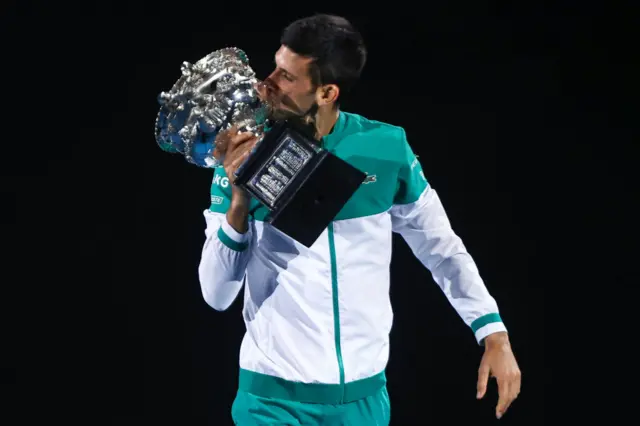 Image source, Getty Images
Image source, Getty ImagesDjokovic beat Russia's Daniil Medvedev to win the Australian Open last year
Novak Djokovic has won the Australian Open a record nine times in his career, including the last three editions of the Melbourne Grand Slam.
Djokovic, Rafael Nadal and Roger Federer have all won 20 Grand Slam titles - the most of any men’s player.
Djokovic has often spoken of his desire to surpass his two great rivals and go clear as the most decorated men’s player of all-time.
He missed out on Grand Slam number 21 at the US Open last year, where he was beaten by Daniil Medvedev.
But Melbourne always felt like the most likely place where Djokovic would win. It's his most successful Slam and arguably the place where he has felt the most support from the crowd.
That is likely to change should he compete this year.
If you're just tuning in to our live page now, welcome.
We're following tennis star Novak Djokovic as he appeals against the cancellation of his Australian visa ahead of the Australian Open tournament.
The case is now adjourned for the afternoon but its due to start again at 3:15PM local time - that's in about half an hour.
Here's a quick recap of what's happened so far.
 Katie Silver
Katie Silver
BBC News, Melbourne
The Djokovic story has captured the world.
Outside the hotel where he is believed to be held, media have outnumbered protestors, with reporters standing side-by-side as they broadcast to their various networks around the world.
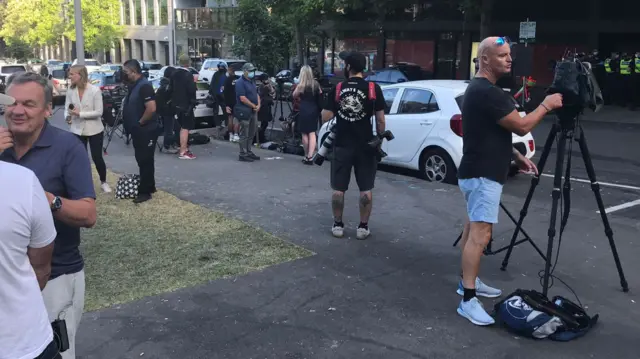
Some journalists from Serbia were even seen dancing with Serbian supporters outside the courthouse, who showed no signs of tiring.
The mood outside the court is festive - traditional Serbian folk dancing music is being played with an accordion and drum.
Every so often, the megaphone and whistles come out and they cheer for Novak.
“Game, set, match” was the cry just now.
Novak Djokovic supporters cheering for him at the Melbourne court
This row has become an international diplomatic storm, with even the prime ministers of Serbia and Australia getting involved.
Serbia has accused Australia of treating their national hero as “a criminal, terrorist or illegal migrant”, according to its foreign ministry.
Australia’s Home Affairs Minister Karen Andrews had earlier denied the tennis star was “being held captive in Australia”, telling reporters: “He is free to leave at any time that he chooses to do so and Border Force will actually facilitate that."
Behind the scenes, it seems discussions have been going on at the highest levels, with Serbian Prime Minister Ana Brnabic saying they had managed to secure “gluten-free food” and “exercising tools” for him during his stay at the Park Hotel.
She also revealed there had been “a positive tone from the Australian side" - although exactly what that means is unclear.
Publicly though, Australian Prime Minister Scott Morrison - who is facing an election this year - has held firm.
“Rules are rules and there are no special cases," he said last week.
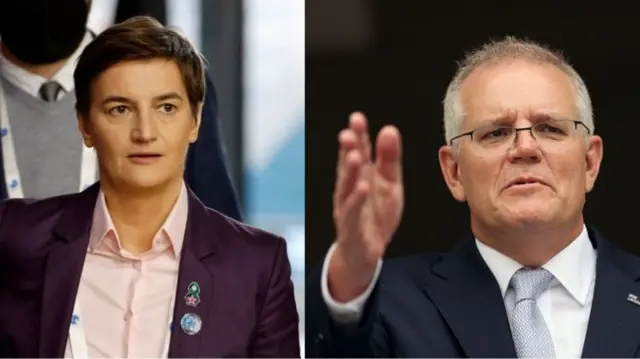 Image source, Getty Images
Image source, Getty ImagesNovak Djokovic: Serbians give their reaction to Australia vaccine exemption row
Djokovic’s mother, Dijana, is understandably upset by what has happened to her son over the last week.
She spoke about her anger during a gathering in support of her son held in the Serbian capital Belgrade at the weekend.
 Katie Silver
Katie Silver
BBC News, Melbourne
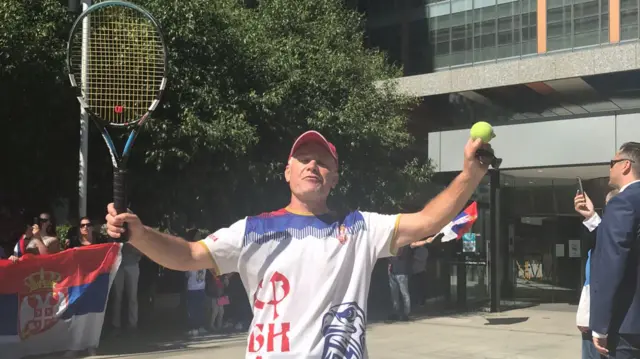 Image source, Katie Silver
Image source, Katie SilverMick Mianovich is a Djokovic fan who has gathered outside the courthouse today in anticipation of the ruling.
“I’m a Djokovic fan and also a big fan of anyone who plays sport. I’m here to help support Novak - sport and politics shouldn’t be mixed up," he said.
“How can you come 20,000 km and be stopped on the border? The Australian government didn’t follow the procedure - it’s nothing to do with Novak. His weapon is this - a tennis racquet and ball, nothing else.”
Judge Anthony Kelly has called for an adjournment until 3:15 local time (04:15 GMT), after which the government's lawyers will continue their arguments.
The government has just begun outlining its response to the seven legal grounds argued by Djokovic's lawyer.
They are denying the grounds of procedural unfairness or unreasonableness.
They're also arguing a different interpretation of the Migration Act and Biosecurity Act. They're rejecting how Djokovic's lawyers have framed it and are arguing other legal principles on how laws can be read.
But the judge warns them that this legal construction isn't necessarily correct, and may be too narrow, particularly in respect to the facts we know about Djokovic's time at the airport.
The government's argument so far is very much framed on defining the legal tests that need to be met - they're trying to question the standards Djokovic's lawyers are using to argue the case.
Essentially, the government is arguing their case through interpretation of legal principles, as opposed to making an argument on the facts.
We've now moved on to the government response and the relevant legal principles they will rely on, as given by federal government counsel Christopher Tran.
He is to speak until 2pm Sydney time (03:00 GMT) and the court will adjourn for a break after
The government's legal team was happy to respond straight away; they declined the judge's offer to take the break to take in what Djokovic's team had just argued.
Lawyers have raced through the last of their legal arguments (centred around Djokovic's treatment by officials at the airport - and have now wrapped up.
They requested the judge make a ruling as soon as possible given the desire for Djokovic to participate in the upcoming Australian Open.
Judge Kelly has agreed with Djokovic's barrister's outline of the pressure on the tennis player.
"The situation in which these grounds are being pressed... it seems uncontroversial that the applicant wanted to wait until 8.30 for the interview."
He also talks about how Djokovic's request for more time was reasonable - it wasn't like he was filibustering or wasting the border official's time by asking for a delay to the interview.
Djokovic's lawyer agrees and repeats how Djokovic was just waiting to give his full answer once he had gotten advice from his lawyers.
Djokovic's lawyer Nick Wood emphasising again how he felt pressured to give his response without properly being able to consult his lawyers. He had also asked to speak to Tennis Australia.
"It was abundantly clear that Mr Djokovic wanted more time until at least 8.30am to speak with his lawyers, with Tennis Australia... to see what was going on, what was in his interests," says Mr Wood.
Instead what happened was that the officers woke up Djokovic around 6am, and then pressured him to give a response as soon as possible, says the lawyer. His visa was cancelled at 7.45am.
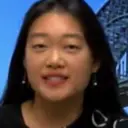 Frances Mao
Frances Mao
BBC News
His lawyers are now onto their final arguments - and it's all about Djokovic's experience at the airport.
This is crucial because much of the legal argument flows from how he was treated and what he was told by officials.
Legal grounds like "procedural unfairness" and "legal reasonableness" are essentially protections for people to be treated according to established rules when a government officer is making a decision about them. In this case it's an immigration official making that decision late at night to cancel Djokovic's visa.
The player's lawyers are arguing that several facts of the situation made this unfair; not least the fact that Djokovic was fresh off a 25-hour plane journey, unrested, and unclear as to what had gone wrong with his visa.
Djokovic didn't get to speak to his lawyers or other authorities who could help during his time at the airport.
After being approached by officials, he asked for extra time to wait until the morning - 0830am - to hear from his team and this was initially agreed to by officials. He then went to sleep to get some rest, but he was woken up around 06:00 by officials who allegedly pressured him to respond "because it was better for him if they made the decision right away".
Djokovic also says they told him to accept his visa cancellation immediately so then his legal team would know what they were dealing with in the morning.
These directions were "spurious" and "manifestly unjust", his lawyer says.
If such grounds of unfairness are convincing to the judge, those are legal errors by which Djokovic can win his case.